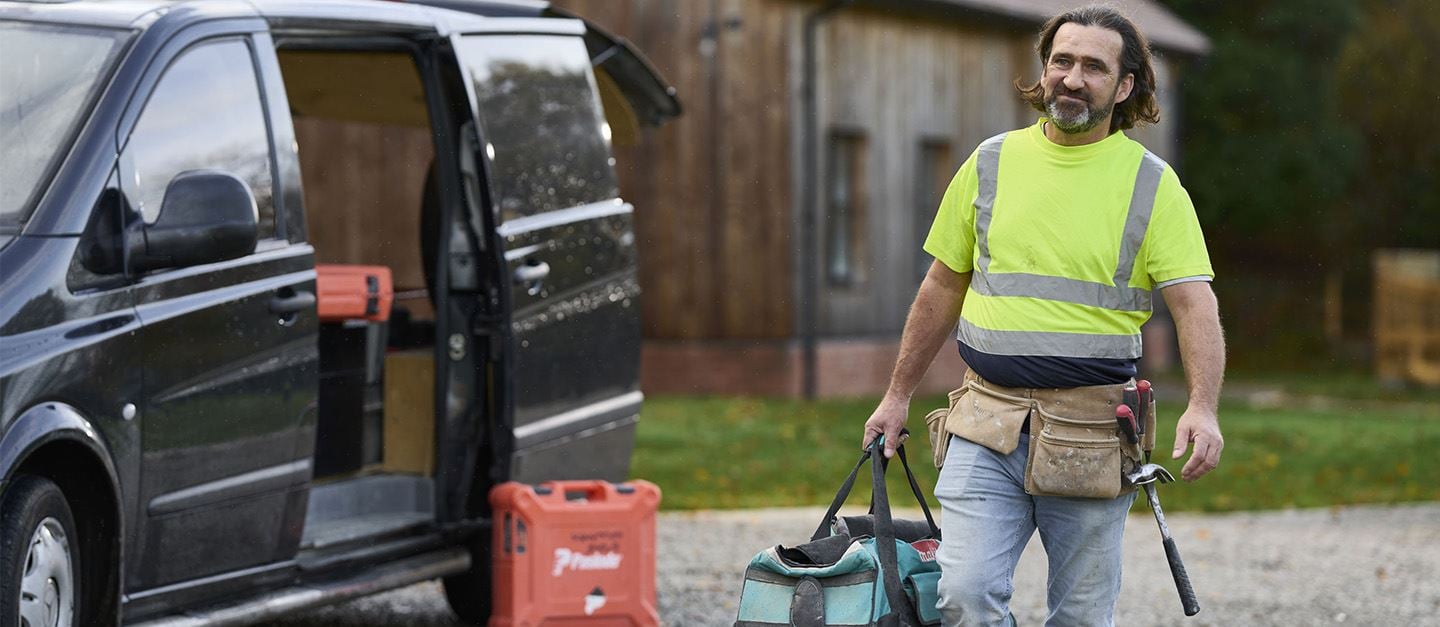Why is being a trusted tradesperson important?
A person’s home is often not only their safe space but also one of their largest assets. When they seek out a tradesman, they’re putting a lot of faith in that person’s ability to fix, improve, or keep that space safe.
As such, trustworthiness of a tradesperson is one of the biggest concerns for consumers when they are looking for home improvements and construction projects. Research from Salesforce shows that 60% of customers consider improving trustworthiness to be a major need for most companies. Tradespeople who don’t seem trustworthy may miss out on a lot of business as customers who are tight on funds seek out businesses which they know they can rely on.
In fact, recent research by Gartner shows that 81% of customers refuse to do business with or buy from a brand that they don’t trust, and 89% expect to disengage from a brand that breaches their trust.
How to become a good tradesman that customers can trust?
Recent research from Checkatrade shows that over a third (37%) of British homeowners have fallen victim to a rogue trade. Statistics like that don’t inspire confidence in the general public when dealing with tradespeople.
But garnering trust is the best way to get more business. So, let’s explore how transparency, professionalism, great communication and reliability can all contribute to trust through this handy list of dos and don’ts:
How to be a transparent tradesperson?
Transparency is crucial in gaining trust with anyone, and even more so with your customers. By being clear about your business practices, skillsets and prices, you can make a customer feel more comfortable working with you.
Do provide a breakdown of your costs.
Checkatrade’s research showed that 60% of consumers do not know how much things are supposed to cost and, as a result, are unaware if they are being ripped off. By doing this, the customer will know exactly what work is going to be carried out and exactly what they’re paying for.
Don't ask for money up front.
Customers can be suspicious of those who ask for full payment in advance. If you need some cash up-front, be clear on what it’ll be used for.
Do be fair with your prices.
Price is often listed as a decisive factor in trusting a tradesman, so only charge what you have to and what is fair. If you’re unsure what to charge for your services, check out our guide on how to price a product. According to Checkatrade, the top negative assumption about traders is that they’re too expensive – so be sure you don’t contribute to this misconception!
Don't go outside of your skill set.
Customers* can be wary of those who try to complete a job that isn’t part of their trade. Manage expectations by being clear on where your skills lie.
Do call upon previous clients.
According to BrightLocal, 98% of people read online reviews for local businesses and the top industries where consumers see business reviews as most important are: Healthcare, Automotive Services, and Service Businesses/Tradespeople. Be sure to ask previous clients to give recommendations whenever possible.
How to be a professional tradesperson?
Professionalism is an important trait to have in any business, and it’s particularly important when it comes to making a good impression on your customers. In Checkatrade’s list of the main negative assumptions about tradespeople, being unprofessional comes in sixth place, making it a major sticking point for customers.
Do present yourself properly.
If your van, uniform and business cards look the part, then it’ll add to the level of trust the customer has in you.
Don’t leave the job unfinished.
Take pride in your work and make sure you carry out the job to the proper standard. A satisfied customer can lead to repeat business or a positive review. Consumers can pursue compensation through Alternative Dispute Resolutions if they’ve paid for work that isn’t completed and this won’t reflect well on your business.
Do have proper cover.
Having the correct insurance cover will give customers confidence when choosing to work with you. Consider getting a comprehensive business insurance cover tailored to trades and be prepared to prove to customers that you have the appropriate cover.
Don’t leave a mess.
A little extra effort can go a long way. Keeping the workspace clean and tidy and disposing of any refuse will keep customers happy and feeling like you’ve done a good job. A task feels more complete when all the cleaning is done and is likely to improve feelings of trust.
Do join the club.
People can find it comforting if you have an industry body membership or accredited qualifications, so it’ll add to your credibility. These can also provide great networking opportunities for you and help you stay on top of the latest innovations in your industry. Look for Government Endorsed Quality Schemes such as TrustMark to help raise your credibility.
Don’t ask for cash.
If you ask for cash, customers may suspect you’re dodging the tax man and could feel uncomfortable with that idea. Communicate payment methods, and if you require cash, be clear on why. Always generate an invoice regardless of payment method.
How to communicate as a tradesperson?
Good communication can help build a long-lasting relationship between you and your customers and help them feel like they’re in the loop about what’s happening with their building project.
Do commit to feedback.
If someone leaves you a review, whether it’s good or bad, take the time to respond and show people that you care about your work.
Don’t be impolite.
78% of people will forgive a company for a mistake after receiving excellent service – so being polite throughout your project can help you save face if an unexpected issue arises.
Do have an online presence.
Having a website or a social media page not only lets people find you more easily, it can indicate that you’re reputable and care about your image. According to HubSpot, social media is the most used channel for marketing with websites in a second-place spot. They also report that businesses active on social media report 45% more sales opportunities.
Don’t leave a bad impression.
According to Salesforce, 91% of customers say they’re more likely to make another purchase after a great service experience, so make sure all your clients are happy clients. Happy clients are also more likely to recommend you to their network and increase your business coming in.
Do exhibit your work.
Being able to see practical examples of previous work is a big factor in helping them decide on who to hire. This gives the potential customer a chance to see how you finish a project, your level of attention to detail, and the quality of your work. Take pictures and display them proudly when you do a job. Where relevant, before and after pictures can really showcase the difference your work makes.
Don’t ignore your phone.
If you do happen to miss a call from a client, make sure you call them back. Today, 82% of customers consider an immediate response very important when they’re calling with a sales enquiry – and 60% of people consider ‘immediate’ to mean 10 minutes or less. While that kind of quick turnaround may not always be possible, try to call back in the same day whenever you can and within 24 hours at the absolute latest.
How to be a reliable tradesperson?
When it comes to building trust, reliability is key to a happy customer and a busy job book. Make sure you’re not letting anyone down. According to Checkatrade, 23% of consumers surveyed think that tradesmen are unreliable – making it one of the top negative assumptions about tradesmen.
Don’t be late.
In Checkatrade’s list of top ten misconceptions about traders, “never showing up” and “always late” take spots eight and nine respectively. Punctuality is expected in any job, but if you’re late you may be keeping the customer from being somewhere they need to be.
Do respect the client.
If you’re going to be working in someone’s home, be sure to treat it with respect. Make sure you have plenty of drop cloths to protect their floors and carpets and that you’re careful of their walls when bringing kit in and out. Customers can be wary of leaving tradespeople alone in their home to carry out work, but knowing that you’ll respect them and their space will make them feel more comfortable.
Don’t change the schedule.
Cancelled or rescheduled appointments can create real problems for your customers and leave them feeling frustrated. If you’ve committed to completing work on a certain day and time, make sure you stick to it.
Do check on your work.
Make sure you follow up on your work and confirm everything is still up to scratch. This can make customers feel like you really care about their home and like they aren’t ‘just another job’.
Don’t hide the truth.
If you accidentally break or damage something, let the customer know and offer to cover any repair costs. It’s only fair.
All links are checked and valid at time of publishing, 28 February 2023.






